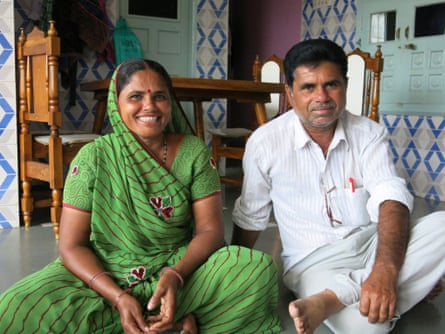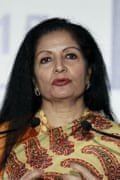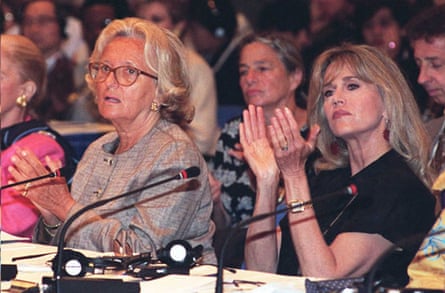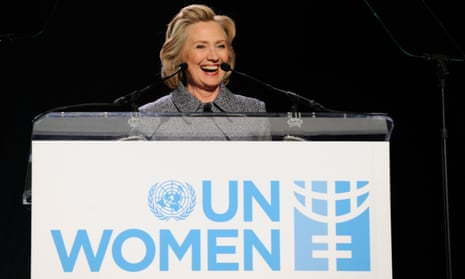It was a milestone for the world’s women: a global summit aimed at transforming the lives of half of humanity. Equality, reproductive rights, maternal health, political representation, social repression, forced marriage, FGM, rape and domestic violence: the message from Beijing in 1995 was that it was time to act.
Among the 17,000 participants were some of the world’s most prominent women, including Hillary Clinton, Benazir Bhutto, the Kenyan environmental and political activist Wangari Maathai, and Madeleine Albright. Aung San Suu Kyi sent a keynote address by video. The declaration – an agenda for change and a call to action – was signed by 189 countries. The summit’s organiser, the United Nations, was rightly proud.
Twenty years on, progress is hard to chart. There have been improvements. Fewer women are dying in childbirth, more are holding political office, and FGM has shot up the agenda. But overall the picture is mixed. Abortion rights are still patchy, violence against women – including rape as a weapon of war – is prevalent, and proper economic equality still a distant dream. Some 37,000 girls are forced into marriage every day. More than 200m women still have no access to modern methods of family planning.
As the UN marks its 70th birthday this autumn, half of humankind may still ask: what has been achieved for us?
One answer can be found in a small village in Gujarat. Here, the good news is that a woman was recently elected head of the village council for the first time. The bad news is that it took Manjuben Mohanbhai Makwana a month to summon up the courage to enter her own office.

“I was one of 12 women elected to the council, but none of us had ever been inside,” she said. “Our husbands ruled in our names.”
An illiterate, low-caste woman who dropped out of school aged five, Makwana broke centuries of tradition that day by lifting the veil from her face, looking the men of Amargarh village in the eye, and asking one of them to vacate her seat.
He laughed, she recalled. “‘Women sit on the floor here, not in chairs,’ he said. ‘And men rule.’”
The example of Gujarat shows that raw data is only half the story. Female representation has surged around the world: there are now 11 parliaments in the world where more than 40% of MPs are women, and nine female heads of government.
In India, after two decades of affirmative action policies, a third of village council seats are reserved for women. But in the Bhavnagar district of Gujarat, where Makwana lives, about 70% of female representatives govern only on paper, as proxies for men, according to Anandi, an organisation that trains rural women for leadership. In April, India’s prime minister Narendra Modi – who ruled Gujarat state before last year’s national election – called for an end to the culture of “husband rule”.
Slowly and with great difficulty, activists in Gujarat are helping women – particularly those from low castes such as 45-year-old Makwana – to participate fully. She has started to tackle basic corruption and a lack of financial transparency with the help of her husband, Mohanbhai, who can read and write.
And they are being encouraged and assisted by UN Women, the agency established in 2010 as a “global champion for women and girls”. UN Women points to its work in India to help women become effective local leaders as a prime example of its achievements – adding that women taking part in local decision-making transforms the lives of families and the most deprived in the community.
According to its deputy executive director Lakshmi Puri, the agency was “the first global institution created by the international community to promote and achieve gender equality, women’s empowerment and women’s rights – all critical areas of human endeavour and aspiration”.
With almost 2,000 staff in more than 90 countries and an annual budget of $690m, its key aims are improving women’s participation in public life, ending gender-based violence and advancing economic equality.
But in the complex and often fragmented world of the UN, some issues critical to women’s lives – such as maternal health, reproductive rights, sanitation and FGM – fall within the remit of other UN agencies, or even between the cracks.
The UN’s millennium development goals helped focus attention on issues such as pregnancy care and childbirth. In the past 25 years, maternal mortality – primarily the province of the World Health Organisation and the UN Population Fund - has fallen globally by 45%. But developing countries still account for 99% of the deaths, with more than half in sub-Saharan Africa.
The 20 years since the Beijing declaration have not been without progress for women. Maternal mortality has fallen sharply – down by as much as 64% in southern Asia and 57% in south-east Asia.
Equality has advanced, though parity is clearly a long way off in most parts of the world.
According to Philomena Okello, a nurse in rural northern Uganda, the millennium targets have made little difference to the women and girls who come through the doors of her hospital in Lira. “Maybe in urban areas, but not deep in the villages,” she said. “The targets should have been set in our environment, not an air-conditioned office but on the ground, where we have no drugs, no beds, no anaesthetic and no electricity.”
For Okello, the real battle is “ignorance, which is still costing the lives of young women in the 21st century”. Women in her area, she added, “are poor; they cannot make decisions; they are uneducated; they are under the rule of the man; they are property”.
She illustrated her point with the story of “Grace”. The 18-year-old was seven months pregnant when high blood pressure caused fits. Her local health centre misdiagnosed malaria but referred her to the hospital when her condition didn’t improve. Meanwhile her family decided she was possessed by demons and sent her to be flushed out by a spiritual healer for three days, while her blood pressure rose further. By the time she arrived at the hospital, it was too late. Eclampsia – easily treated – cost her her life.
UN Women liaises closely with other UN agencies, but also has to respect bureaucratic and organisational demarcations. According to Puri, it focuses on creating a framework of standards, strengthening national laws and intergovernmental agreements, and pushing for gender equality to be an integral element of action and agreements on all issues, including climate change, financial and economic measures, peace and security.
It also runs high-impact campaigns to challenge attitudes, and creates strategic partnerships with civil society organisations and grassroots groups. “There is an umbilical cord between us and women’s organisations. We steer, support, convene, and help them get political traction at local, national and global regional level. This is a key aspect of what we stand for.”
In Chile, UN Women issues more than a dozen small grants of about $25,000 each year in programmes to empower women in the workplace and reduce gender-based violence – a major issue in Latin America.
One grant, made jointly with the European Union, went to to a group of young professionals who, tired of constant cat-calling and insults, organised a campaign against sexual harassment in the streets. They welcomed the UN’s backing. “It’s not the money really, it’s the prestige of having UN Women behind you that opens doors,” said sociologist Francisca Valenzuela, 25.

She and her fellow campaigners used the grant to conduct polls on the extent of sexual harassment. The findings were then publicised on city buses and social media. As a result, so many lawyers volunteered for the campaign that the group was able to draft a law against sexual harassment in the streets, which is soon coming up for a vote in the Chilean congress. “This project came from civil society, from young women who began to question this. We created the project and launched the law,” said Valenzuela.
“What we want here is to open up the spectrum of what is considered violence against women,” said María Inés Salamanca, UN Women’s programme director in Santiago. “The law in Chile only covers domestic violence, not violence in public spaces.”
UN Women has also helped to fund a union of domestic housekeepers to fight for better working conditions. Many maids come from abroad to work in Chile, where they face working 15-hour days and are at high risk of rape by young Chilean men.
In contrast to many countries where it struggles for visibility, UN Women has a special status in Chile. President Michelle Bachelet was its founding director and was elected to her second presidential term in December 2013 with a clear promise to push a women’s rights agenda, including increased political participation by women and an end to Chile’s harsh anti-abortion laws.
In one of just six countries in the world that maintains an absolute ban on abortion, Chilean politics is still beholden to both the Catholic church and an entrenched political elite far more conservative than the general public.
In other countries too, some women’s organisations and activists say that UN Women is hampered by the entrenched power of religious and state institutions that seek to block real gender equality.
One close observer of UN agencies that deal with women’s rights said rightwing religious organisations engaged in “hardcore lobbying” against the liberalisation of abortion laws. “When you sit in the canteen at the UN [headquarters in New York], you see all these groups setting up camp with their little abortion dolls, lobbying and nobbling. When you inch forward with anything to do with women’s rights at the UN, you face immediate pushback,” she said.
Sylvia Walby, a gender expert at Lancaster University, said the US government often worked in tandem with the Catholic church on gender issues. “The US has been the crucial actor in blocking the UN agencies being able to address issues of sexual and reproductive rights. There have been the most extraordinary coalitions between the US and the Catholic church.”

Puri rejected any suggestion that UN Women had been reluctant to confront the Catholic church or other organisations seen as opponents of women’s rights. “We’ve been absolutely unequivocal in working against anything that masquerades as culture, religion or tradition that violates or undermines the rights of women,” she said. The agency had instead “sought to engage faith-based groups across the different religions … in order to change the way faith interprets gender equality and women’s empowerment”.
More general criticism of UN Women and other bodies dealing with women’s rights comes from analysts and activists, most of whom would only speak to the Guardian off the record. Some said that UN Women was too focused on lobbying at government level and writing endless reports at the expense of helping the grassroots women’s organisations best placed to effect concrete change.
“They have not lived up to the promise that a lot of civil society activists and advocates who fought for this entity were really hoping for,” said one. “They haven’t been a grassroots ally.”
“Their rhetoric needs to be matched by action. They speak about ‘empowerment’ all the time, but they need to be more practical and challenging. We need a lot more investment in linking grassroots activists to the global lobbying,” said another.
A third accused UN Women of “writing reports that simply repeat reports that have already been written” – although she conceded that this was a general feature of UN agencies. “‘Advocacy’ is a way of pretending you’re changing the world when you’re not.”
At this year’s Commission on the Status of Women, an annual UN conference to review progress on implementing the recommendations of the Beijing declaration, almost 800 women’s organisations backed a statement from the Women’s Rights Caucus criticising the commission’s communique as “a bland reaffirmation of existing commitments that fails to match the level of ambition in the Beijing declaration and platform for action, and in fact threatens a major step backward”.
But there is praise too. “UN Women has made an important contribution in creating standards … to push governments to introduce equal rights legislation,” said one activist. However, she added: “There was great jubilation at its creation but now there is a sense that while it has tackled some issues head on, it has not been very outspoken on the greatest threat to women’s rights – the rise of illiberal movements across the globe.”
Walby said UN Women’s most positive contribution had been its campaign to end violence against women. “It’s made [the issue] impossible to ignore and it has set standards.” More generally, she added, UN Women had “provided a space in which civil society groups can engage at a local level. It’s been an important facilitator of transnational cooperation on gender equality.”
Some critics were sympathetic to the hindrances faced by UN Women. “It’s under-resourced, the small new kid on the block, still establishing itself politically. Its mandate is normative policy work in New York, but it’s also operational – and most of its country teams are pretty small while expectations are high,” said one.
“Those are very real concerns. But I also think that as an entity it needs to step up a little more and take on some of the more controversial issues. It needs to be a little more feisty on women’s rights – and that’s something you hear from lots of civil society partners working regularly with UN Women. I don’t think it’s really found its footing as a stroppy women’s rights voice – and that’s what we’d like it to be.”

The UK government assessed UN Women in March 2013 as part of an aid review, concluding it had made progress on all measures on which its chief predecessor, Unifem, had been judged weak and poor value for money two years earlier. UN Women, the report said, had given more authority to regional and country offices, and had made improvements on costs, transparency and accountability. This month, the UN general assembly will endorse a new set of goals to tackle global poverty, inequality and climate change over the next 15 years. The sustainable development goals [SDGs] – which replace the millennium development goals adopted in 2001 – are expected to include strong commitments to women’s rights and gender equality.
But women’s rights organisations fear pushback when it comes to their implementation. “There is cause for celebrating the commitments made for women and girls in the agreed outcome document for the SDGs. This feeling, however, is bittersweet. For feminists and activists demanding a systemic transformation to global development, the 2030 agenda is weak on providing the financial and structural changes needed to make this outcome document a reality,” said Ana Inés Abelenda, economic justice coordinator at the Association for Women’s Rights in Development (AWID).
Puri was optimistic. “We are working closely with all constituencies, partners and civil society to ensure we have the strongest ever reflection of the gender equality agenda and commitment. This is a never-before opportunity, an acceleration moment, and we’ve already waited two millennia. We hope that every country, city and village will seize it. This is something that will never come again.”

Comments (…)
Sign in or create your Guardian account to join the discussion